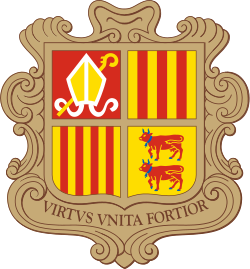This article needs additional citations for verification .(April 2024) |
| Ministeri d'Afers Exteriors del Principat d'Andorra | |
 | |
| Ministry overview | |
|---|---|
| Formed | 1993 |
| Type | Ministry |
| Headquarters | Andorra la Vella |
| Minister responsible | |
| Parent department | Government of Andorra |
| Website | www |
The Ministry of Foreign Affairs (Catalan : Ministeri d'Afers Exteriors) is the Andorran government ministry which oversees the foreign relations of Andorra.
